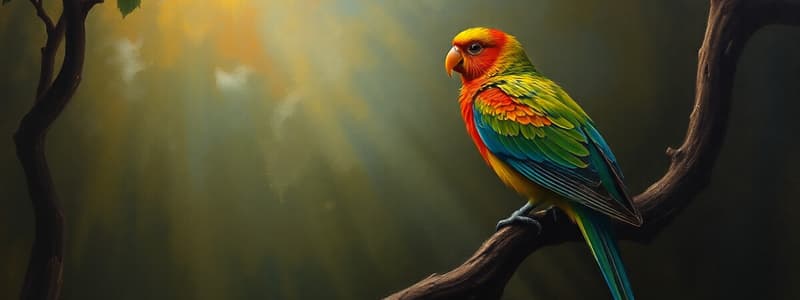Podcast
Questions and Answers
What is one method scientists are considering to potentially recreate the moa?
What is one method scientists are considering to potentially recreate the moa?
- Cloning using DNA from ancient feathers
- Hybrid breeding with modern mammals
- Natural selection from surviving relatives
- Genome editing to mimic its DNA (correct)
What unique characteristic did the Carolina parakeet have that affected its interactions with predators?
What unique characteristic did the Carolina parakeet have that affected its interactions with predators?
- A genetic mutation that made it toxic (correct)
- Ability to mimic the sounds of other birds
- Large size compared to other birds
- Bright colors that attracted predators
What historical event in 1918 is significant to the Carolina parakeet?
What historical event in 1918 is significant to the Carolina parakeet?
- The species was documented by Audubon
- The initial genome sequencing occurred
- First sightings in the wild
- The last captive individual died (correct)
Which scientific method was used by researchers to reconstruct the DNA of the Carolina parakeet?
Which scientific method was used by researchers to reconstruct the DNA of the Carolina parakeet?
Why is back-breeding required for the moa, according to scientists?
Why is back-breeding required for the moa, according to scientists?
Which parrot species was found to be a close genetic relative of the Carolina parakeet for genome sequencing?
Which parrot species was found to be a close genetic relative of the Carolina parakeet for genome sequencing?
How did the extinction of the Carolina parakeet likely occur?
How did the extinction of the Carolina parakeet likely occur?
Which characteristic makes the moa's DNA particularly viable for research?
Which characteristic makes the moa's DNA particularly viable for research?
What does polyphyletic mean in the context of moa genetics?
What does polyphyletic mean in the context of moa genetics?
What role did the sun parakeet play in the research of the Carolina parakeet's genome?
What role did the sun parakeet play in the research of the Carolina parakeet's genome?
Which of the following most likely contributed to the extinction of the Carolina parakeet?
Which of the following most likely contributed to the extinction of the Carolina parakeet?
What toxic plant did the Carolina parakeet favor, which contributed to its unique ecological interactions?
What toxic plant did the Carolina parakeet favor, which contributed to its unique ecological interactions?
How have scientists attempted to study the moa's genome?
How have scientists attempted to study the moa's genome?
Which aspect of the moa's extinction is particularly noted for making research feasible?
Which aspect of the moa's extinction is particularly noted for making research feasible?
What was notable about the appearance of the Carolina parakeet as described by early observers?
What was notable about the appearance of the Carolina parakeet as described by early observers?
Which factor is NOT a reason for the potential difficulty of back-breeding moas?
Which factor is NOT a reason for the potential difficulty of back-breeding moas?
What factor contributes to the complexity of understanding the true ancestry of the moa?
What factor contributes to the complexity of understanding the true ancestry of the moa?
What challenge do researchers face when considering back-breeding for the moa?
What challenge do researchers face when considering back-breeding for the moa?
Which bird is used as a reference for reconstructing the DNA of the Carolina parakeet?
Which bird is used as a reference for reconstructing the DNA of the Carolina parakeet?
What does the extinction of the Carolina parakeet indicate about the impact of human activities?
What does the extinction of the Carolina parakeet indicate about the impact of human activities?
What aspect of the Carolina parakeet's genetics set it apart from other bird species?
What aspect of the Carolina parakeet's genetics set it apart from other bird species?
In which year was the last known Carolina parakeet in captivity recorded?
In which year was the last known Carolina parakeet in captivity recorded?
Which factor is most likely to enable the cloning of the moa despite its extinction?
Which factor is most likely to enable the cloning of the moa despite its extinction?
How did John James Audubon describe the abundance of the Carolina parakeet in its natural habitat?
How did John James Audubon describe the abundance of the Carolina parakeet in its natural habitat?
Flashcards are hidden until you start studying
Study Notes
Moa
- Moa DNA is relatively intact, allowing for possibilities like cloning or genome editing to recreate the species.
- The first nuclear genome of an extinct moa species was assembled in 2018.
- Moa may have been genetically polyphyletic, meaning they had multiple ancestral lineages.
- Back-breeding moa may be challenging because their exact ancestors are unclear and modern relatives are much smaller.
- Some recently extinct moa species might be cloneable using living ratites.
- Intact moa eggs and feathers can still be found today.
Carolina Parakeet
- The Carolina parakeet was the only parrot native to the eastern United States and one of just three parrot species native to the country.
- The parakeet was known for its vibrant colors: red face, yellow head, and green wings.
- The Carolina parakeet thrived in noisy flocks from the Atlantic Coast to Oklahoma.
- The last captive Carolina parakeet died in a Cincinnati zoo in 1918.
- The species was declared extinct after a few possible sightings in the wild.
- The Carolina parakeet had a unique genetic mutation that allowed them to tolerate cockleburs, a toxic plant, making them resistant to many predators.
- Scientists successfully sequenced the genome of a century-old Carolina parakeet specimen in 2019.
- The researchers used the South American sun parakeet, which diverged from a common ancestor 13 million years ago, to help assemble the DNA fragments.
- The extinction of the Carolina parakeet, along with the passenger pigeon, was likely caused by a swift event, possibly human settlement or disease spread from chickens.
- Reintroducing the Carolina parakeet is currently not advisable without a better understanding of the factors that led to its extinction.
Moa
- Moa DNA is still present, making cloning or genome editing to mimic a moa possible
- In 2018, scientists assembled the first nuclear genome for an extinct moa species
- Moa may have multiple ancestral lines
- Back-breeding requires more research due to unclear ancestors
- Some recently-dead species may be cloneable using living ratites
- Intact moa eggs and feathers still exist today
Carolina Parakeet
- The Carolina parakeet was the only native parrot in its range and one of only three parrot species native to the United States
- It was known for its bright colors: red face, yellow head, and green wings
- The parakeet thrived in noisy flocks from the Atlantic Coast to Oklahoma
- The last captive Carolina parakeet died in 1918 at a Cincinnati zoo
- After a few possible sightings, the species was declared extinct
- The Carolina parakeet possessed a genetic mutation that allowed them to consume cockleburs, a toxic plant
- In 2019, scientists sequenced the Carolina parakeet's genome from a century-old specimen
- Researchers used the sun parakeet from South America to assemble the DNA fragments
- The extinction of the Carolina parakeet and other birds, including the passenger pigeon, was likely caused by a rapid event, possibly human settlement or chicken diseases
- Scientists caution against bringing back the Carolina parakeet until they understand the cause of extinction due to the risk of disease transmission from chickens
Moa Extinction and Potential Revival
- Moa DNA is still present, enabling potential cloning or genome editing for revival.
- The first nuclear genome of an extinct moa species was assembled in 2018.
- Moa may be polyphyletic, meaning they have several ancestral lines.
- Back-breeding moa is complex due to unclear ancestry and the small size of modern relatives compared to their giant ancestors.
- Some recently extinct moa species may be cloneable using living ratites.
- Intact moa eggs and feathers can still be found today.
Carolina Parakeet Extinction and Genome Sequencing
- The Carolina parakeet was the only indigenous parrot in its range and one of only three native to the US.
- European settlers were amazed by its vibrant colors: red face, yellow head, green wings.
- They thrived in large flocks across the eastern US.
- The last captive Carolina parakeet died in 1918 at a Cincinnati zoo.
- Possible sightings in the wild led to the species being declared extinct.
- The Carolina parakeet had a genetic mutation that allowed them to tolerate cockleburs, a toxic plant.
- In 2019, scientists sequenced the genome of a century-old Carolina parakeet specimen.
- Researchers used the sun parakeet, a distant relative, to assemble the DNA fragments of the extinct bird.
- The extinction of the Carolina parakeet, along with the passenger pigeon, was likely caused by a rapid event, possibly human interaction or disease spread from chickens.
- Until the exact cause of extinction is determined, reviving the Carolina parakeet is considered unwise.
Studying That Suits You
Use AI to generate personalized quizzes and flashcards to suit your learning preferences.




